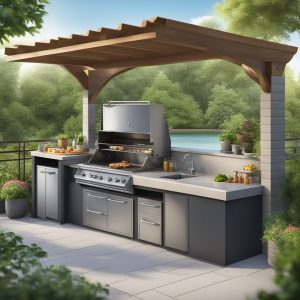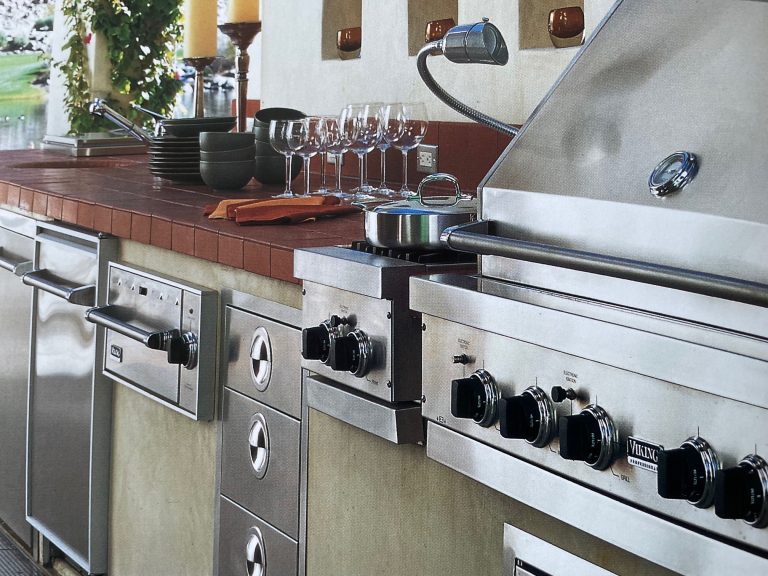Does an Outdoor Kitchen Need a Foundation?
Does an Outdoor Kitchen Need a Foundation: Expert Opinion

If you’re considering building an outdoor kitchen, you might be wondering whether or not it needs a foundation. The answer, as with many things, is: it depends. The type of outdoor kitchen you’re building, the materials you’re using, and the location of your outdoor kitchen can all impact whether or not a foundation is necessary.
Generally speaking, if you’re building a permanent outdoor kitchen, it will require a foundation. This is because a permanent outdoor kitchen will be built with materials like concrete, stone, or brick, which require a solid and stable base. On the other hand, if you’re building a portable outdoor kitchen, you may be able to get away without a foundation. For example, if you’re using a pre-made grill station or outdoor kitchen island that comes with wheels, you can simply place it on a flat surface like a patio or deck. However, keep in mind that even a portable outdoor kitchen may require some kind of support or leveling to ensure it’s safe and sturdy.
Key Takeaways
- The type of outdoor kitchen you’re building will impact whether or not it needs a foundation.
- Permanent outdoor kitchens typically require a foundation due to the materials used.
- Portable outdoor kitchens may be able to get away without a foundation, but still require a stable and level surface.
Foundation Requirements for Outdoor Kitchens
When planning to build an outdoor kitchen, one of the most important considerations is the foundation. A solid foundation ensures that your outdoor kitchen is safe, durable, and long-lasting. In this section, we will discuss the foundation requirements for outdoor kitchens, including how to assess the need for a foundation, choosing the right foundation material, and determining the correct foundation size and thickness.
Assessing the Need for a Foundation
The first step in building a foundation for your outdoor kitchen is to assess the need for one. In most cases, an outdoor kitchen needs to be built on a foundation to support its weight. The foundation should be able to withstand the weight of the kitchen appliances, countertops, and other features. Without a foundation, your outdoor kitchen may sink, shift, or even collapse, causing damage to your property and posing a safety hazard.
Choosing the Right Foundation Material
Once you have determined that a foundation is necessary, the next step is to choose the right foundation material. The most common materials used for outdoor kitchen foundations are concrete, masonry, wood, and steel. Concrete is a popular choice because it is strong, durable, and long-lasting. Masonry is also a good choice because it is strong and can be customized to match the design of your outdoor kitchen. Wood is a good choice if you want a more natural look, but it may not be as durable as other materials. Steel is a good choice if you want a modern, industrial look, but it may be more expensive than other materials.
Determining the Correct Foundation Size and Thickness
The final step in building a foundation for your outdoor kitchen is to determine the correct size and thickness. The size of the foundation will depend on the size of your outdoor kitchen and the weight it will need to support. The thickness of the foundation will depend on the type of material you choose and the soil conditions in your area. It is important to excavate the area where the foundation will be built, level it, and make sure it is plumb before pouring the foundation.
Building a foundation for your outdoor kitchen is an important step in ensuring its safety, durability, and longevity. Assessing the need for a foundation, choosing the right foundation material, and determining the correct foundation size and thickness are all important considerations when building an outdoor kitchen. By following these guidelines, you can ensure that your outdoor kitchen is built on a solid foundation that will last for many years to come.
Design and Planning Considerations
When planning the construction of an outdoor kitchen, several key factors need to be considered to ensure a solid foundation and a functional layout.
Layout and Location
The initial step is to carefully assess the layout and location of your outdoor kitchen. Consider the flow of foot traffic, proximity to indoor kitchen access, and the positioning of key elements such as the grill, sink, and refrigerator.
Selecting Materials and Appliances
Selecting durable, weather-resistant materials for countertops, cabinets, and flooring is essential for an outdoor kitchen. Additionally, choosing high-quality appliances designed specifically for outdoor use will ensure longevity and performance.
Utility Connections and Safety
Ensure that proper utility connections for plumbing, electricity, and gas are available in the designated area. Prioritize safety by adhering to building codes and regulations, obtaining the necessary permits, and considering fire safety precautions in the outdoor kitchen design.
Frequently Asked Questions
What is the ideal material for constructing the frame of an outdoor kitchen?
When constructing the frame of an outdoor kitchen, it is important to choose a material that is strong enough to support the weight of the appliances and countertops. Steel and aluminum are popular options due to their durability and resistance to rust and corrosion. Wood is also a viable option, but it requires regular maintenance to prevent rot and decay.
How much does it typically cost to install an outdoor kitchen?
The cost of installing an outdoor kitchen can vary greatly depending on the size, materials used, and complexity of the design. On average, a basic outdoor kitchen can cost anywhere from $2,000 to $10,000, while a high-end kitchen can cost upwards of $50,000 or more.
What are some budget-friendly outdoor kitchen designs?
If you are on a tight budget, there are several ways to design an outdoor kitchen without breaking the bank. One option is to opt for a smaller kitchen with fewer appliances and features. Another option is to use affordable materials such as concrete or brick instead of more expensive materials like granite or marble.
Is it necessary for an outdoor kitchen to have a covering?
While it is not absolutely necessary for an outdoor kitchen to have a covering, it is highly recommended. A covering can protect the appliances and countertops from the elements, as well as provide shade and shelter for the cook and guests. Popular covering options include pergolas, awnings, and umbrellas.
Can you build an outdoor kitchen directly adjacent to a house?
Yes, you can build an outdoor kitchen directly adjacent to a house. However, it is important to ensure that the kitchen is properly ventilated and that there is enough space between the kitchen and the house to prevent fire hazards. It is also important to check with local building codes and regulations before beginning construction.
What is the recommended thickness for a concrete slab under an outdoor kitchen?
The recommended thickness for a concrete slab under an outdoor kitchen is at least 4 inches. This will provide enough support for the appliances and countertops, as well as prevent cracking and settling over time. It is also important to ensure that the slab is properly reinforced with steel mesh or rebar.






